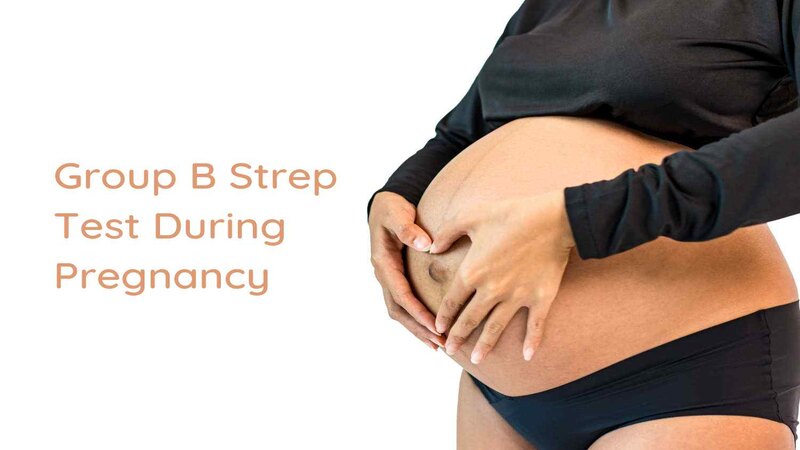
Group B strep or GBS is a bacteria that generally resides in our digestive, genital, and urinary tracts. This bacteria, though relatively harmless for adults, can cause concerning health conditions in newborns. In women, GBS mostly resides in the vaginal and rectum region. As a result, it can easily pass on to the baby during vaginal birth. Hence the Group B strep test during pregnancy is important.
If you are pregnant and willing to go for a vaginal delivery then you must get the GBS test done. Here you can learn about the test and its necessity during pregnancy. You will also get to know when and how you should take a GBS test and what would be its treatment. This bit of knowledge can save your baby from serious health hazards that GBS can induce.
What is Group B Strep Test?
Group B Strep Test is a diagnostic test that points out the presence of Group B Streptococcus bacteria in the vagina or rectal area of the would-be mother. This test is necessary because the asymptomatic Group B Strep bacteria can cause serious health issues in newborns.
So Group B Strep Test is vital to protect the baby from exposure to this harmful bacteria during vaginal birth. There is no chance of exposure in case of a pre-planned cesarean c-section delivery. Yet doctors conduct this test to ensure safety in case premature labor occurs.
What Are The Main Health Issues Related To Group B Strep?
In adults, GBS does not cause life-threatening health issues. Fatigue, fever, muscle stiffness, chest pain, etc. can occur in adults due to GBS infection. In most adult women, GBS generally remains hidden without any alarming symptoms.
But during pregnancy, GBS can cause infection in the placenta and urinary tract. As a result, the baby can easily get infected with GBS while passing through the vagina during natural birth. And in newborns, GBS gets fatal by causing infections of the skin, lungs, and blood that result in meningitis, pneumonia, sepsis, etc.
Who Should Be Tested For Group B Strep?

All pregnant women should get tested for GBS for the safety of the baby. Unlike Group A strep, which causes throat infection, GBS often does not show symptoms. If a woman tests positive in the GBS test then doctors provide antibiotics to fight out the bacteria before childbirth. Thus you need to take the GBS test to not pass on the bacteria to your baby.
When Is The Group B Strep Test Done?
Your doctor or midwife will take the test when you are about 36 or 37 weeks pregnant. This time is appropriate because there is a chance that the baby comes out anytime after 37 weeks. Testing earlier will be confusing to predict whether the baby will carry GBS in case of late delivery (after 40 weeks).
Is It Possible To Go Into Labor Without Being Tested For Group B Strep?
In general, your doctor will suggest you take a GBS test. If you miss the GBS test, your doctor may give you IV (IntraVenous) antibiotics in the labor room. So it is possible to go to labor without a GBS test, but you should not do it.
Here are a few cases where you may require antibiotics for Group B Streptococcus
- Previous pregnancy with GBS
- Previous baby with GBS
- Preterm labor (before 37 weeks i.e. before the testing of GBS)
- Premature rupture in the membrane
- Fever during labor
How Is Group B Strep Testing Done?

Your doctor can conduct your Group B strep test in two ways during pregnancy; swab test and urine test. Besides, a blood test and a spinal tap test can also detect GBS infection in the body.
A swab test is the most common and effective way to rectify the presence of GBS in the vaginal tract.
For the swab test, you have to lie on your back while the practitioner takes the swab from the vagina. Practitioners use small cotton sticks to gather the cell and fluid samples from the rectum and vagina for the test. And for urine tests, you will have to collect and send your urine sample to the lab for GBS testing.
How Is GBS Treated?
If the GBS test shows positive results, then your doctor will give you antibiotics. In case of GBS presence in the vagina, your doctor will give you antibiotics intravenously i.e. directly through your veins. In case of GBS presence in the urine, your doctor can prescribe you regular oral medicines. But intravenous or IV mode of treatment is far more effective than oral medicines to subdue GBS during labor.
You will receive IV antibiotics for GBS not more than 4 hours before delivery. This is because taking antibiotics earlier may prove less effective as GBS bacteria grow back very fast. Your doctor may escape GBS treatment if you decide to go for the cesarean c-section delivery.
GBS treatment in pregnant women can significantly reduce the number of babies who get GBS-positive during birth. According to a report, 1 in every 200 babies catches the GBS bacteria if the mother is untreated. But the number decreases to 1 in 4000 babies if the mother receives GBS treatment before childbirth.
Are There Any Risks Of Being Tested For GBS During Pregnancy?
There are no possible risks of getting tested for GBS during pregnancy. The diagnosis further helps in avoiding other complications that can pass on to your baby. Many women will not exhibit any kind of symptoms with GBS in their bodies. Hence, it is always better to get it tested to avoid any kind of risks for you and your baby.
However, if you test positive for GBS during pregnancy, the risk of passing the bacteria to your baby increases. The risk of passing GBS to the baby gets higher if it is more than 18 hours after the water breakdown and delivery.
In the case of GBS infection, newborns can develop symptoms such as:
- Difficulty in breathing
- Difficulty in feeding
- Vomiting milk
- High or low temperature
- Very fast or very slow heart rate
- Change in skin color or blotchy skin
Thus, in case of a previous GBS infection or additional medical conditions, one needs to be extra careful.
According to the NIH report, you should not stop breastfeeding your baby even if you carry GBS as your breast milk contains necessary antibiotics for your baby. With antibiotic treatment before delivery, you can successfully prevent GBS from passing on to your baby. Even if the baby gets a GBS infection, early monitoring and treatment can recover your baby soon. In only rare cases the GBS results up to the life-threatening level of meningitis or sepsis. So you should not fear GBS and take all your tests and medicines on time
FAQ’s
Does GBS Go Away After Pregnancy?
GBS may go away or remain in your body after pregnancy. If you test as GBS-positive that does not mean you will carry it forever. Maintaining good gut health, a balanced diet, and proper vaginal hygiene can help you stay away from GBS.
What Does Strep B Discharge Look Like?
GBS infection can make your vaginal discharge yellowish or greenish. You may additionally feel irritation or a burning sensation in the vagina.
Reference
https://my.clevelandclinic.org/health/diseases/11045-group-b-streptococcus–pregnancy
https://medlineplus.gov/lab-tests/strep-b-test/
https://www.cdc.gov/groupbstrep/about/prevention.html
https://www.whattoexpect.com/pregnancy/pregnancy-health/prenatal-testing-group-b-strep/
https://www.nhs.uk/common-health-questions/pregnancy/what-are-the-risks-of-group-b-streptococcus-infection-during pregnancy/

